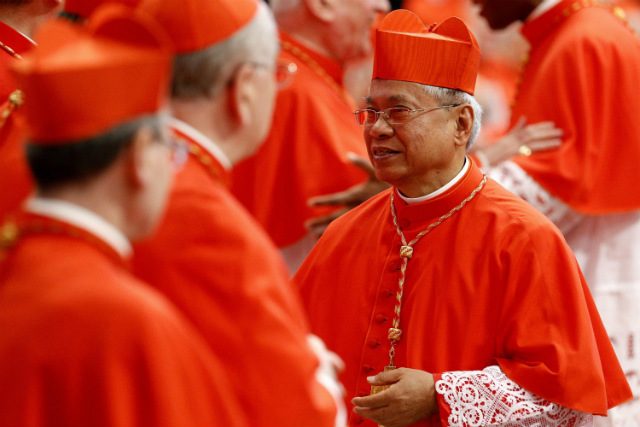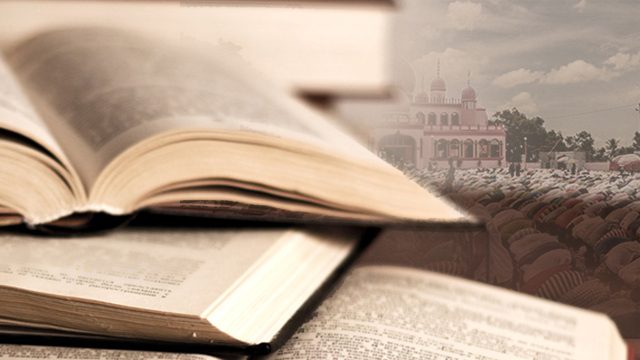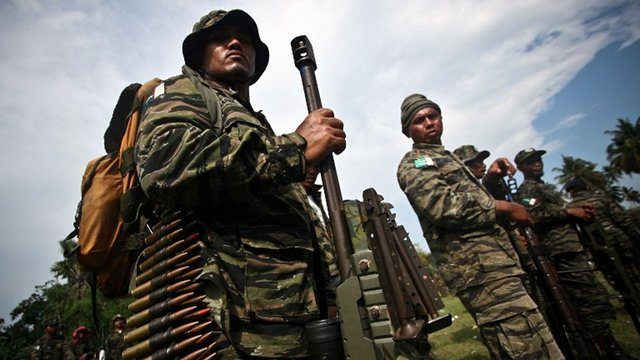SUMMARY
This is AI generated summarization, which may have errors. For context, always refer to the full article.

COTABATO CITY, Philippines – Cotabato Archbishop Orlando Quevedo, the first cardinal from Mindanao, has witnessed the emergence and escalation of the conflict in the South.
As a young priest during the Martial Law years, Quevedo said he witnessed how government forces indiscriminately bombed Muslim areas.
“I was with Christian and Muslim students watching the jets, hearing the explosions, when a Muslim student said: ‘Father, it’s unfair. My cousins are there, but they don’t have bullets and missiles,” Quevedo said, recalling an instance which deeply disturbed him.
It opened his mind to the plight of the Bangsamoro and the historical injustice they have suffered. (READ: Cardinal to Bongbong: Correct your father’s sins vs Muslims)
Rappler talked to Quevedo about his long history of peace advocacy work in conflict areas in Mindanao where his archdiocese is located.
Now a church leader, Quevedo particularly puts his faith in the proposed Bangsamoro Basic Law, which seeks to create a more powerful autonomous Muslim region.
Below is an excerpt from our interview with Quevedo on June 7, 2015 at his official residence in Cotabato City. For brevity, a few questions asked in a mix of Filipino and English have been translated into English:
RAPPLER: Cardinal, you’ve seen the plight and historical struggle of the Bangsamoro here in Mindanao. In your view, as a supporter of the BBL, why is it important to people in Mindanao? How will it help address the root causes of the conflict?
CARDINAL QUEVEDO: The BBL is very important for a lasting peace. It has been the product of so many, many years of negotiations that were often, in the beginning, (pursued) in a hostile environment – lack of trust with each other. And finally, after several years, they began to trust each other again – the MILF panel and the government panel, despite changes in personnel, after so many years of debate. The BBL is a product of that.
For me, it promises a just and lasting peace here. I have seen conflicts here since the time of Abubakar (all-out war in 2000), and before that, the displacement of the people during the time of MNLF (Moro National Liberation Front) in the 1970s. And then massacres taking place against Muslims and massacres against Christians – usually paramilitary forces and militia. So the dislocations of hundreds and thousands of families during these years, and then finally the MILF negotiation took place, and again many years also and many massacres on both sides.
As a religious leader looking at Muslims and Christians suffering because of the conflict, The BBL to me, will promote a just and lasting peace. And the mainstream rebels will join the government in making sure that peace will really last. Of course, we all know that even when peace is signed and peace is made into law there will be still isolated rebels who will go against the peace because they would like to have independence – or secession – from the government, and you would have the younger ones and those who would like to have a radical position on the matter.
So you would still have the BIFF (Bangsamoro Islamic Freedom Fighters), unless they are attracted already by the BBL itself. You will still have criminal groups which are not ideological. They do not have any real political purpose. Groups like Abu Sayyaf, for instance, who are into kidnapping and killings. You will still have those. But at least you would have the main 12,000 of the military force of the MILF now preparing to lay down their arms. I think that would be a significant peace for all.

RAPPLER: The Catholic Church itself faces criticisms on the separation between the church and the State. There are those who believe BBL will facilitate the convergence of Islam and the State. As a church leader who is facing the same issue, what do you say to the notion that the new Bangsamoro entity mixes politics with religion?
QUEVEDO: That is also another misconception about the BBL. The BBL itself explicitly recognizes religious freedom for all the citizens.
Number two, the BBL prescribers a democratic form of government, not a government that is theistic, that is like the union of church and state. No, it is not an Islamic government, it is a parliamentary democratic form of government. The role of leaders, religious leaders in the BBL would be advisory.
But even then, I think Congress is looking into the advisory council “Wali.” They were talking about maybe making some amendments on that, or even deleting the idea of a “Wali.” But a “Wali” is not necessarily a religious leader. The council of elders will be dissolved. They will have a role in that, so it is not a government that is Islamic, it is democratic and parliamentary; and freedom of religion is enshrined in the BBL.

RAPPLER: You’ve tried to explain the past and the future without the BBL. But how do you explain this to people who are not familiar with history, who get fragments of information from social media? What do you say to them?
QUEVEDO: I think that’s important, that after Mamasapano, even after the visit of the Pope, the prejudices and biases began to rise again among the adults. It is surprising to me that the SWS, the Social Weather Stations, gave a summary of the findings, saying that much of the opposition outside the BBL are people from outside the Bangsamoro. And much of those outside the BBL are Christians in general, but most of them are Catholics.
Another surprising thing is that most of the people against the BBL have not read the BBL, and therefore, only rely on the media, that is written by commentators, and they themselves may have not really looked at the BBL. I think that many of them did not read the BBL because they mainly have misconceptions about the BBL. For instance number one, the MILF is looking for independence. That’s entirely not in the BBL at all. The BBL itself explicitly says that it will be part of the Philippine territory. The national sovereignty of the Philippines will still be persevered and the BBL recognizes that; the MILF recognizes that.
Number two, they believe the BBL is a stepping stone towards independence. It seems that they don’t know that Congress is the one that makes it into a law. And any amendment, and revision to the BBL, which changes the BBL into something, the movement will be cut down by Congress, which is the lawmaker. People don’t realize that, but people are afraid because, again, of historic prejudices and biases. And number two, they are afraid because they really don’t know the law.

RAPPLER: You’re aware of the survey that reveals many Catholics disapprove of the BBL. What does this say about the church? What do you say to them as a church leader?
QUEVEDO: I believe that this is a failure of the Church in general, and also of the church leadership, of having not been able to evangelize properly our own people, especially the young. The pride, the prejudices, and biases erupted after Mamasapano.
And after Mamasapano, the opinions of people especially from those outside the Bangsamoro area have been expressed in a very negative language against our own fellow citizens in Mindanao who are Moros. I believe the words of the Gospel are very important for us now. The words of the Gospel (are peace, respect, and justice).
We need to go out and look perhaps into first ourselves, our consciouses and let the Gospel disturb our conscious so that once the gospel reaches out heart, then perhaps there is a change of heart, and perhaps there is a change of mind, and we become more open not simply to the Gospel, which is the most important, but also to others who do not belong to our faith.
This happened in Ireland, this would also happen in the Philippines. Ireland came to a war with Christians, and (here) in the Philippines, we have the conflict between Muslims and Christians. What happened in Ireland was peace, and I hope and pray that the end for us here in the Philippines will be peace. – Rappler.com
Add a comment
How does this make you feel?
There are no comments yet. Add your comment to start the conversation.